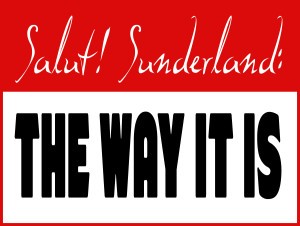
So, the 12th day of Christmas – and of Pete Sixsmith‘s look back at memorable games played over the Christmas/New Year period – can be said to have arrived. They think it’s all over. Ah, but Pete has a Baker’s Dozen in mind …
See the full series here: https://safc.blog/category/sixers-sentiments/sunderlands-twelve-days-of-christmas/
12. Jan 5 1974: Carlisle United FA Cup Third Round (a) Drew 0-0
Quite appropriate that we look at this one on the very day that the Cumbrians make the journey across the A69 for a third round tie in a much changed footballing world.
Both teams were in the same division that year, with United being the stronger of the two sides. They finished third and, in the days before play offs, they went up into the First Division, spending a season there and topping it early on.
We finished in sixth place, two points behind them in a disappointing season which saw the break-up of the FA Cup winning side and new players coming in, only one of who, Tony Towers, going on to make a lasting impression in a red and white shirt.
We had lost Richie Pitt in a home defeat to Luton in September and David Young covered for him. Young was a useful player without ever totally convincing, the kind of player who was a good squad man but never an automatic first team choice.
Ron Guthrie was injured and was replaced by young tyro Joe Bolton who already had a good number of first team games under his belt. Billy Hughes was the other Wembley hero to miss out and his place was taken by, er Rod Belfitt.
Belfitt arrived from Everton in an £80,000 deal in October 73, around the time we beat Sporting Lisbon at Roker in the Cup Winners Cup. He had been a bit part player at Leeds under Revie, scoring 33 goals in 178 appearances before moving on to Goodison, where a further 16 games gave him 2 goals.
Former Sunderland winger Billy Bingham was responsible for taking him to Merseyside and he must have used the gift of the gab to get Bob Stokoe to take him. He never looked comfortable and scored four goals in the 38 appearances he made for us. Mind you, Jozy Altidore and Danny Graham would sell their souls at a crossroads for stats like that.
It wasn’t a very happy club by January 1974, with rumblings of discontent from Tueart in particular and a feeling amongst older fans (of which I was not one at that time) that maybe Stokoe wasn’t as good as we all thought he was).
We were 12th in the table, having lost at home to Notts County on New Year’s Day a game where Vic Halom had barged County keeper Roy Brown over the line to open the scoring. A 22,000 crowd moaned and groaned as Les Bradd and Don Masson punished us but at least we had the FA Cup to fall back on – or so we thought.
The crowd at Brunton Park was 20,595, squeezed into a ground which looked very similar to how it does now. The new Michael Knighton Stand has replaced the cow shed that stood down the side, but there have been few other changes. There were many Sunderland fans that had made the short journey across, not exactly full of optimism, but hoping that a decent result against a decent team would kick-start our season.
They had some useful players, many of them with North Eastern connections. Les O’Neill had been at Darlington before he crossed the Pennines. He was a small, but tenacious, wing half who would run all day. Bill Green the centre half had joined from Hartlepool and Joe Laidlaw, a tricky winger was a former ‘Boro player.
Add to that the guile of Chris Balderstone, the man who played football and county cricket on the same day and an outstanding goalkeeper in Alan Ross and this was not going to be an easy win.
It wasn’t and I remember precious little about the game which ended as a rather turgid 0-0 draw. They came back to Roker Park on the Wednesday afternoon and a goal from Dennis Martin (which looked offside) put us out, making us the first holders to go out in the third round for many years.
That game was played on a Tuesday afternoon as the country was on a three day week. Prime Minister Ted Heath was in the process of asking the question “Who runs the country, the government or the miners”? and the election of February of that year made it clear that most people didn’t think that it was Heath. Harold Wilson became Prime Minister, heralding a golden period of prosperity that was destroyed five years later when the nation inexplicably chose Margaret Thatcher.
Puts a Cup defeat in perspective, that does.
Join the Salut! Sunderland Facebook group – click anywhere along this line
![]()
And follow us on Twitter: @salutsunderland … click along this line

Fancy leaving a comment? Not sure what you have to say fits this post? Go to the new feature – https://safc.blog/2013/07/salut-sunderland-the-way-it-is/ – and say it there.
I’ve had enough of isims of all hues, they’ve all failed us , just to different degrees at different times , this current lot being particularly odious. Give me someone who speaks common sense and lets celebrate Sunderland winning the cup and stopping up! What’s my chances of either ?
Suitably chastened, I shall refrain from tongue in cheek statements, Comrade Workers.
In a lifetime of listening to aspirations/hopes/lies of politicians I tend to trust history. Where has Socialism ever worked in the interests of the people? Having said that, where has Capitalism done likewise? Difficult isn’t it?
That’s why discussing football is more interesting.
Football never lets you down, we ( Sunderland and England to a lesser degree)supporters expect nowt and guess what…..
‘Socialism works great until it runs out of other people’s money.’ – Margaret Thatcher
Here’s hoping Sunderland isn’t running out of Ellis Short’s.
I remember the replay particularly well. It was actually the only time I skived from school, getting the OK bus to Sunderland in the morning, with a change of clothes in my bag instead of books.
Getting home that evening obviously disappointed that another cup run had come to an end, I was questioned by Dad who asked me if I had had a good day at school. Yes I answered, as you do. Only to find out that for some inexplicable reason, he had chosen to pay a visit to the Headmaster to ask how I was getting on.
Funnily enough, Mr Howells, the Head, had similar questions to Dad the next day.
Ha’Way the Lads!
Wikipedia is hardly a balanced source Phil, but there was an element of tongue in cheek. It’s the only way I can face up to the depression that seems to haunt me at the moment.Either that or copious quantities of Bailie Nichol Jarvie!!!
I think everyone appreciates that in many articles Wiki espouses the views of the last person to edit an article, but my quote contained facts not opinions!
Something else that I’ve just stumbled upon is in direct relation to the mining industry.
Maggie (11 years as PM) closed 160 pits, 14 a year.
Harold (8 years as PM) closed 290, 36 a year.
Never allow the facts, though, to get in the way of a good old socialist rant!
Maybe your malt will help you forget just how every Labour Government has, almost, bankrupted the country, whilst hitting the working man the hardest in the pocket!!
“Harold Wilson became Prime Minister, heralding a golden period of prosperity that was destroyed five years later when the nation inexplicably chose Margaret Thatcher.”
I think that you must have a pair of rose tinted glasses Pete, or a very large tongue in your cheek!
The actual economy during 73/79 was dire!!
“The UK recorded weaker growth than many other European nations in the 1970s; even after the early 1970s recession ended, the economy was still blighted by rising unemployment and double-digit inflation, which exceeded 20% more than once after 1973 and was rarely below 10% after this date.
In 1976, the UK was forced to request a loan of £2.3 billion from the International Monetary Fund. The then Chancellor of the Exchequer Denis Healey was required to implement public spending cuts and other economic reforms in order to secure the loan, and for a while the British economy improved. However, following the Winter of Discontent, when Britain was hit by numerous public sector strikes, the government of James Callaghan lost a vote of no confidence in March 1979. This triggered the May 1979 general election which resulted in Margaret Thatcher’s Conservative Party forming a new government”
http://en.wikipedia.org/wiki/Economy_of_the_United_Kingdom#1945_to_1979